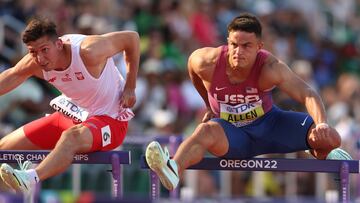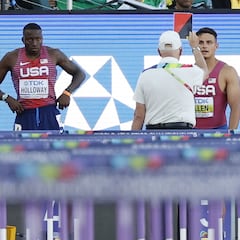Devon Allen’s false start: Was his disqualification fair? What does the rule say?
Track athlete and NFL wide receiver Devon Allen was disqualified from the 110-meter hurdles for a false start that was not quite visible to the naked eye.


It was a painful day for track Olympian and NFL wide receiver Devon Allen, as he was disqualified from the finals of the 110-meter hurdles for a false start at the 2022 World Athletics Championships in Oregon.
The decision to disqualify Allen caused some controversy, as the future Philadelphia Eagles wide receiver did not actually start before the gun went off, but rather pushed off so quickly after it did that it fell under the category of a false start.
What is a false start in athletics?
World Athletics, the body which determines international rules for track and field, has set the threshold for false starts at 100 milliseconds or 0.1 seconds- this means that any athlete that pushes off the block within 100 milliseconds after the gun goes off is considered to have made a false start. The reason behind this limit is that humans are not believed to be capable of reacting to the starting gun at a speed faster than that.
In Allen’s case, he pushed off at 0.099 seconds, or a thousandth of a second too fast, enough to be flagged for a false start. The athlete’s reaction time is measured electronically using the plates of the starting blocks, so the decision was not made by a race official. His disqualification was simply the result of sticking to what the competition rules say.
Devon Allen SHOULD NOT HAVE BEEN DISQUALIFIED.
— Robert Griffin III (@RGIII) July 18, 2022
He didn’t jump the gun.
He didn’t flinch.
He got punished for being TOO FAST.
Watch for yourself.
pic.twitter.com/03xd3S3JHm
The findings of a World Athletics study
Related stories
There has already been a study commissioned by World Athletics itself, that found that reactions to sound can go as fast as 80 milliseconds. The study, conducted way back in 2009, recommended that the 100 millisecond threshold be lowered to 80 or 85.
Unfortunately for the three-time national champion, his quest for a world title was foiled because the rule has not been changed according to this recommendation. But because of the controversy stirred up by what happened to Allen, there are calls to amend the false start threshold, arguing that it is arbitrary and outdated, and should adapt to the evolving field of track athletes.
To be clear unfortunately Devon Allen was robbed because of an antiquated World Athletics rule, not by the officials. Officials can’t just decide in the moment to disregard a rule violation even if it’s a stupid and unfair rule. WA need to change the rule!
— Michael Johnson (@MJGold) July 18, 2022

